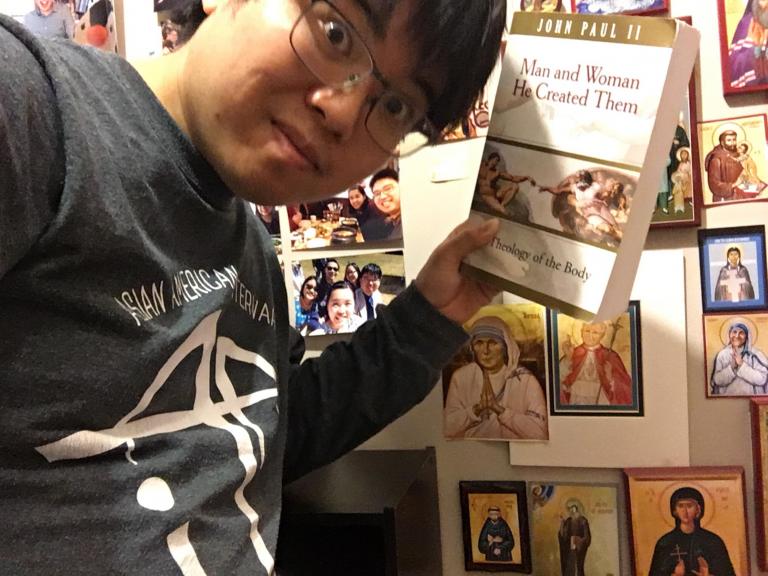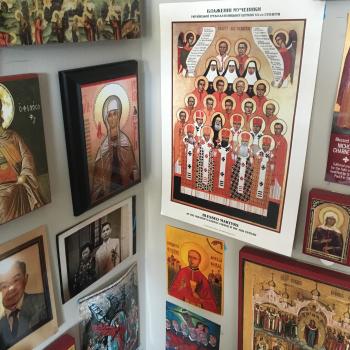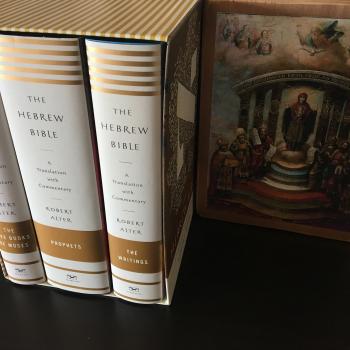
When I was in my catechumenate, folks at the temple I was at were all abuzz about Melinda Selmys’s book Sexual Authenticity. At the time, a number of the people attending could have been described as evangeliCatholic, sisters and brothers from the Latin Church who took their faith as seriously and pietistically as evangelicals and often hung out with their Protestant counterparts to boot. As it was, Theology of the Body was making another round, and was described as amazing, although everybody there seemed only to be taking courses on it because reading John Paul II was apparently too difficult. Selmys was introduced to us as a way of bringing the cookies down to the lower shelf for us. She was also advertised as a former lesbian who had gotten rid of her ‘SSA’ (for those not in the know, ‘same-sex attraction’) and was now married to a man and had a bunch of kids. That made her the female Dennis Jernigan of Catholicism. Ooh, said the residually evangelical part of me.
All of that, of course, made me automatically suspicious of the book. I mean, I am, for all of my cynicism, remarkably fine with some theology-of-the-body apologists (hereafter referred to by their affectionate acronym ‘TOB’). When I was blogging as Chinglican on A Christian Thing, our fellow blogger Churl was friends with the theologians Brett Salkeld and Leah Perrault, the dynamic Canadian duo who had adapted TOB for Catholic teen dating courses. Perrault, of course, had gone the extra mile and written Theology of the Body for Everybody. I confess that I liked them; their books were, after all, a far superior species to I Kissed Dating Goodbye back from the world of non-Catholic evangelicalism from which I hailed.
To be fair, at that point, I thought anything was better than evangelicalism at that time. As an Anglican, I got into Life Teen, Steubenville, the Maher/Assad duo, how Jackie François got touched by an Angel, even the Legionnaires and Opus Dei. They were all so fascinating to me in a kind of ironic hipster way as I was firmly perched outside the mix, never to enter into communion (so I thought). I read them all through the lens of cynicism, as one does as an Anglican and as I could because I was an outsider and they were therefore not my problem. It was as if they were all in a secret conspiracy to troll evangelicals into Catholicism by having aesthetics and acoustics purposefully worse than what they were imitating, as if the words I shall not want could be taken in all the ways. Salkeld, for example, I knew as a serious theologian in his own right, and hadn’t he done those amazing interviews on Vox Nova with the openly gay Catholic theologian James Alison?
It never occurred to me that folks in the evangeliCatholic tribe were actually serious about being evangeliCatholic, except for maybe Christopher West, who looked so serious in promoting his version of TOB to the definitely unserious Thomas Rosica whenever he was on Salt and Light TV. But that was the thing: Perrault, Salkeld, Rosica, and all the rest of them always seemed to have that knowing smile, that there was something to distinguish their serious work for niche audiences and their trolling when it came to their apologetics. I mean, what even is Catholic apologetics? thought I. Do you prove that hagiographies are like scientifically true? That would be embarrassing, my thinking continued. I knew, for example, that the Latin Church had taken out the mother of all virgin martyrs, literally the model of chastity — who was not (as many would expect) the Most Holy Theotokos, but St Thekla — out of the calendar because of lack of historical evidence that she even existed. It was in the same vein that I liked Simcha Fisher. She was, I thought, the worst walking advertisement for natural family planning (she has like ten kids) and probably knew it. Definitely ironic, I mused.
That is why I was suspicious of Selmys. I suspected, more precisely, that folks at the temple were taking her way too seriously. A book titled Sexual Authenticity, published by Our Sunday Visitor, with an introduction that shows her to be a serious thinker, writer, and researcher? Definitely a troll move. I was worried, then, when the book became adopted for our catechumenate. Fortunately, it was not a problem, as I was the only one in the ‘program’ (they call me protocatechumen up there), and it wasn’t really a program either, because it was really just personal spiritual direction, coupled with patience about my theological questions regarding Eastern Christianities. My spiritual father told me that he was recommending it for me precisely because it was so authentic, which I had my doubts about because authenticity was in the title, and so if I coming from Protestantism was not completely convinced of the merits of Humanae Vitae and the Catholic arguments against contraception, at least Selmys would be honest about it.
I read it. It took me until literally the day of my chrismation to finish, and I finished it because I really wanted to become Catholic that day. It was slow-going because I constantly suspected that I was reading apologetics, and I hated apologetics because I was running from evangelicalism, and Karl Barth had said that any Gospel that needs an apologetic is not a Gospel, and I had really thought that I had successfully left them behind in my past, and then was slowly discovering late in my catechumenate that there really were apologists in Catholicism and Orthodoxy, and they weren’t ironic people at all. But for all my complaining and procrastinating, the book still yielded some very surprising conversations in the catechumenate. We spent a whole session talking about what canon law, not just ‘moral theology,’ might have to say about sexuality. We discussed the prospect of having children and how the entirety of my catechumenate was really one very long marriage counselling session — or rather, a rehabilitation course in how to be a husband who does not manipulate his wife. We talked about how chastity is not about repressing sexual urges, but ‘using the road,’ as my spiritual father said, in terms of being joyfully integrated with my desires in my body. I’m not sure how many of these things Selmys actually talked about. But then, I was chrismated, which means I finished it.
After my reception, I was received into another family: Patheos Catholic. To my surprise, as I was only a tangential reader of the channel, I discovered that I was colleagues with the one without whose book I would not have been chrismated: Mindy Selmys. She gave her location as rural Ontario. I wondered if she lived around St Elias Brampton. But she wasn’t Eastern Catholic. That was curious, I thought. I had been led to believe that all Catholics around there were Greek Catholic.
I wouldn’t say that Selmys and I have ever been close. We’ve probably exchanged a comment or two here and there on each other’s posts, no more, no less. But secretly, often without sharing or leaving an Internet trail, I’d read her blog and follow her social media posts. She probably doesn’t read mine; nobody has time for my 3,000-word navel-gazing posts. I like her blog. In fact, I’d say that whoever this Selmys is now has certainly grown from Sexual Authenticity. Catholic Authenticity Selmys tells it like it is, without much irony (much less, anyway, that Fisher, whom I still think of as ironic). Violence against trans women is just misogyny, I remember her tweeting once, and I thought that was not only gutsy for a Catholic writer to say, but also true, and hilarious when she followed up with a post calling Christian men to ‘cock block’ for Jesus by protecting and believing trans women about their fears of misogyny. She wrote about the bad advertising for natural family planning. She wrote about her crises of faith. She wrote about misogyny as she experienced it in the Church.
It began to occur to me well into my period of mystagogy that Selmys’s propensity for reflexivity was not at all ironic, and probably not as apologetic as I suspected she might have been. If anything, it might even have been authentic, as in, she was dealing with stuff even while writing Sexual Authenticity, and whatever she is writing, she writes about it as best as she can and as much as she can in a public way. Like any skilled writer, there are also silences, things that are not disclosed and that should never be known to a reader, partly because they are not relevant to the story and therefore nobody’s business. It was inspiring and refreshing, especially when our channel had that very public meltdown about Sick Pilgrim and how the white male founder whose name I have conveniently forgotten was actually preying on the victims of the spiritual abuse that he had gathered into that community.
In the past few weeks, I have learned that there is nothing funny about what Selmys has been going through. Her writing modality is not ironic; it is tragic. Whereas before we might have been led to think that her criticisms of Latin rigidity on contraception or misogyny against trans women were conceptual, now we know that she was enduring an abusive marriage and that her thoughts on natural family planning stem from her experience of it with an alcoholic. Her crisis of faith originated in a personal and sustained encounter with a misogynist — an educated one, at that — and the fact that she is even going to church at all, even an Anglican one (which means it has apostolic succession), is a marvel. To me, the wonder of it all is that she keeps writing about it, publicly reflecting on her very messy life and linking how the ideology of the Latin Church enabled her abuser to how the system perpetuates the very public sex abuse scandal that is going on there right now. I’d just quit, which is technically what she did for a time when all we got was radio silence from her.
It is poetic, then, that in the wake of Selmys walking away from the Latin Church, the critics that have piled on to say that she is no longer Catholic and therefore has no business writing for Patheos Catholic are, as my sister and brother on Steel Magnificat point out, those who style themselves Catholic apologists. Quoting an abuse advocate, my editor Rebecca Bratten Weiss points out the true irony in this situation: that these people seem more shocked that Selmys is not attending a parish in the Latin Church than they are that she was writing from a place of being abused for so long. Selmys, of course, has responded with grace, pointing out that she has discerned that writing about abuse to a Catholic audience is why she has stayed on with this channel.
Notice the movement here, then. It is as if the apologists expect Selmys to be one of them, defending the teachings of the church against a world that to them is scarily secular, practicing Latin prayer in a public way, and all the things. For them, that is the only point there is to writing. To write, according to them, is to speak from a position of authority, to declare, to defend, to assert, and perhaps some of the most hilarious parts of the criticism that has been directed at Selmys have been the ones where the apologists engage in a kind of internal dialogue with themselves about how Selmys must certainly think about her move instead of actually listening and observing what she is doing. Selmys, on the other hand, has never really taken upon herself the role of apologist. She reflects. She asks questions. She does research, which leads to more questions. We know that that research often comes from a personal place, and now we know viscerally how painful that position is. And yet, she continues – reflecting, asking, researching, writing, asking more.
If this is not the theology of the body, I don’t know what is. All the TOB people, including the popularizers and apologists, must certainly agree with this, that the point of TOB, as John Paul II writes in the opening section of the catecheses, is that the body has a language of its own, that its experience speaks of God, and that that voice of the acting body must be heard and discerned. Without this careful attending to the body, there is no chastity; how, after all, can one integrate the body’s desires without listening to what they are?
But this insight, I propose, is where the theology of the body actually turns into mystagogy. Two years after I was received into the church, I undertook a reading project while riding an exercise bike every night. I read all of Theology of the Body in a month. It was then that I saw how the apologists and the popularizers were as correct as those who engage in deep listening to the body when it comes to TOB. The problem, as I said to a close friend after reading it, is that John Paul II wants to have his cake and eat it too. He wants to listen and attend to both the body and the tradition, a bit like Paul Evdokimov’s Sacrament of Love, but Wojtyła is no Evdokimov. Theology of the Body is a very loud set of catecheses, and it is noisy because John Paul II says he’s listening to the body, but in fact, he is trying to make the body listen to Scripture and tradition and then contend that that is what the body is actually saying in truth. James Alison is right: it is an attempt to stuff all of human desire into the book of Genesis. The result is beautiful, for sure — a romantic vision of what Scripture and tradition say about how the body participates in marriage that displays the mystical communion that we participate in at the level of being itself. But, as I said to my friend, this book could only have been written by an unmarried man. Everyday life in a marriage is not that fancy.
But John Paul II is also fundamentally right — marriage is a mystery, and it does display something of ontology, but if we are to follow this teaching, we will need to move from catechesis to mystagogy, from listening Wojtyła’s lectures to engaging in the messy reality of married life itself. It is that mystagogy to which Selmys has invited us, bringing us into her own life where that marriage is not at all romantic — it was with an alcoholic abuser, it led to trauma for her and her children, it has made her associate the Latin Church with abuse, it has resulted in having to have another man in the home, a relationship about which the apologists are now wildly speculating when it really is none of their business. What is our business, Selmys is saying, is that the messiness of her marriage invites us to the mystagogy of our own intimate spaces — our marriages, and to be inclusive of those who are unmarried, our relationships, families, intimacies, and desires more generally. Mystagogy happens there because if those relationships are themselves mystery, then living in them is the practice by which the reflection where we truly learn about the primacy of love in the existence of the world and ourselves in it is generated. As if to channel Wojtyła himself, Selmys calls us to rise and be on our way, to grow up past the infantile stage of apologetic monologue and enter in the dialogue of mystery itself, to do the theology of the body through the messy experiences of our everyday lives.












